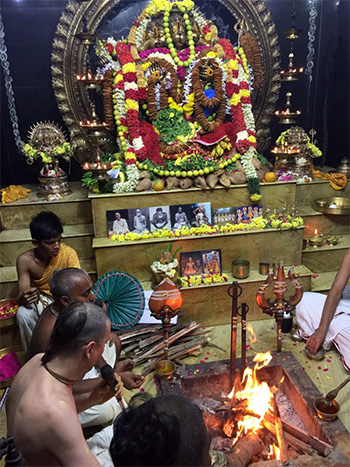Question: What types of meditation and yoga do the Hindu’s practice? Also, what does their religious pactice consist of?
Yoga originated with the self realized rishi (seer) named Patanjali. He composed a text in sanskrit known as the Yoga-sutras, or the codes of yoga. He divides yoga into eight limbs, and because of this his system of yoga is known as Ashtanga Yoga. The eight limbs of yoga, according to Patanjali, are yama (rules), niyama (regulations), asana (sitting postures), pranayama (control of breath), pratyahara (withdrawl of the senses from the sense objects), dharana (concentration), dhyana (meditation), and samadhi (complete absorption). According to Patanjali the object of one’s meditation is the Paramatama, or the form of God situated in the heart of all living entities.
Besides Patanjali’s system of Ashtanga-yoga there are other systems of yoga based on the general meaning of the word “yoga”. Yoga comes from the root word “yuj”, which means to link two thinks together which are constitutionally compatible. It refers to the linking of one’s consciousness with the will of the divine consciousness. Based on this understanding of yoga, three systems of yoga have developed in India, namely karma yoga (to link with the Absolute through one’s actions), jnana yoga (to link with the Absolute through cultivation of spiritual knowledge), and bhakti yoga (to link with the Absolute through devotion to God).
Among these three systems of yoga, bhakti yoga is established as the highest in the ancient text known as Bhagavad Gita. In the Gita Krishna explains the three systems of yoga, pointing out that they are different steps on a ladder leading to self-realization. The first step being karma yoga, and the final step being bhakti yoga. According to texts such as the Gita and the Srimad Bhagavatam, bhakti is itself the ultimate goal of spiritual endeavour, and it is synonymous with moksha, or liberation.
Lord Krishna states in the Gita:
yoginam api sarvesham
mad gatenantar-atmana
shraddhavan bhajate yo mam
sa me yuktatamo matah
“Of all yogis, the one with great faith who always abides in Me, thinks of Me within himself, and renders transcendental loving service to Me – he is the most intimately united with Me in yoga and is the highest of all. That is My opinion.”
TEST-2





